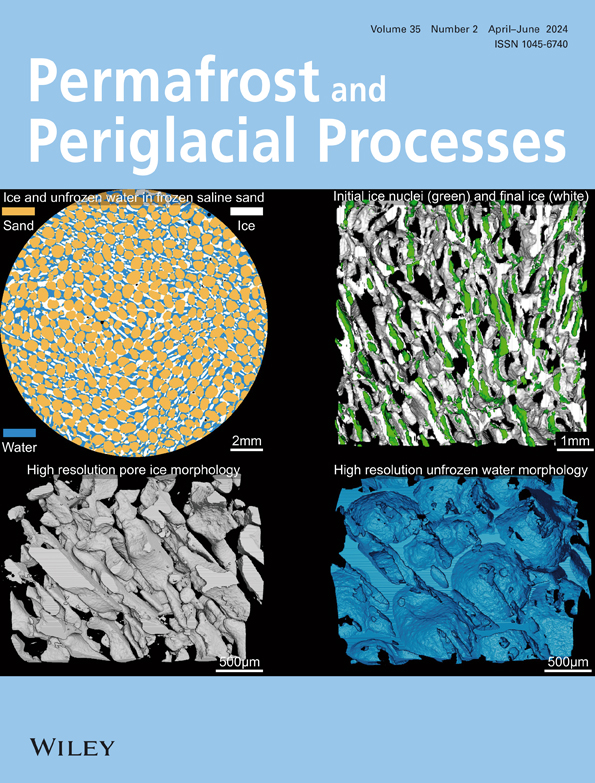多年冻土区具有不同雪况和特性的亚北极道路的表面能平衡
IF 3.3
3区 地球科学
Q2 GEOGRAPHY, PHYSICAL
引用次数: 29
摘要
地表能量平衡(SEB)对冻土热状态、冰冻水文过程和基础设施稳定性有重要影响。道路建设和积雪影响下伏多年冻土的能量平衡。在此,我们使用阿拉斯加高速公路的实验路段开发了一个SEB模型,以量化具有不同雪况和性质的不同土地覆盖类型的地表能成分和地表温度(GST)。结果表明,进入路基中心和斜坡的热量主要受净辐射的控制,而较少受感热通量的控制。在春季,来自路基中心的侧向热通量导致路基坡面积雪较早消失。在冬季,与积雪覆盖的路堤中心相比,路堤斜坡上的积雪形成的隔热层减少了三倍的热量损失。路基中心和边坡的地表温度偏差分别为5.0°C和7.8°C。路基坡面释放的热通量随积雪深度的增加呈指数递减,随秋季积雪时间的提前和春季积雪时间的缩短呈线性递减。本文章由计算机程序翻译,如有差异,请以英文原文为准。
Surface energy balance of sub‐Arctic roads with varying snow regimes and properties in permafrost regions
Surface energy balance (SEB) strongly influences the thermal state of permafrost, cryohydrological processes, and infrastructure stability. Road construction and snow accumulation affect the energy balance of underlying permafrost. Herein, we use an experimental road section of the Alaska Highway to develop a SEB model to quantify the surface energy components and ground surface temperature (GST) for different land cover types with varying snow regimes and properties. Simulated and measured ground temperatures are in good agreement, and our results show that the quantity of heat entering the embankment center and slope is mainly controlled by net radiation, and less by the sensible heat flux. In spring, lateral heat flux from the embankment center leads to earlier disappearance of snowpack on the embankment slope. In winter, the insulation created by the snow cover on the embankment slope reduces heat loss by a factor of three compared with the embankment center where the snow is plowed. The surface temperature offsets are 5.0°C and 7.8°C for the embankment center and slope, respectively. Furthermore, the heat flux released on the embankment slope exponentially decreases with increasing snow depth, and linearly decreases with earlier snow cover in fall and shorter snow‐covered period in spring.
求助全文
通过发布文献求助,成功后即可免费获取论文全文。
去求助
来源期刊
CiteScore
9.70
自引率
8.00%
发文量
43
审稿时长
>12 weeks
期刊介绍:
Permafrost and Periglacial Processes is an international journal dedicated to the rapid publication of scientific and technical papers concerned with earth surface cryogenic processes, landforms and sediments present in a variety of (Sub) Arctic, Antarctic and High Mountain environments. It provides an efficient vehicle of communication amongst those with an interest in the cold, non-glacial geosciences. The focus is on (1) original research based on geomorphological, hydrological, sedimentological, geotechnical and engineering aspects of these areas and (2) original research carried out upon relict features where the objective has been to reconstruct the nature of the processes and/or palaeoenvironments which gave rise to these features, as opposed to purely stratigraphical considerations. The journal also publishes short communications, reviews, discussions and book reviews. The high scientific standard, interdisciplinary character and worldwide representation of PPP are maintained by regional editorial support and a rigorous refereeing system.

 求助内容:
求助内容: 应助结果提醒方式:
应助结果提醒方式:


